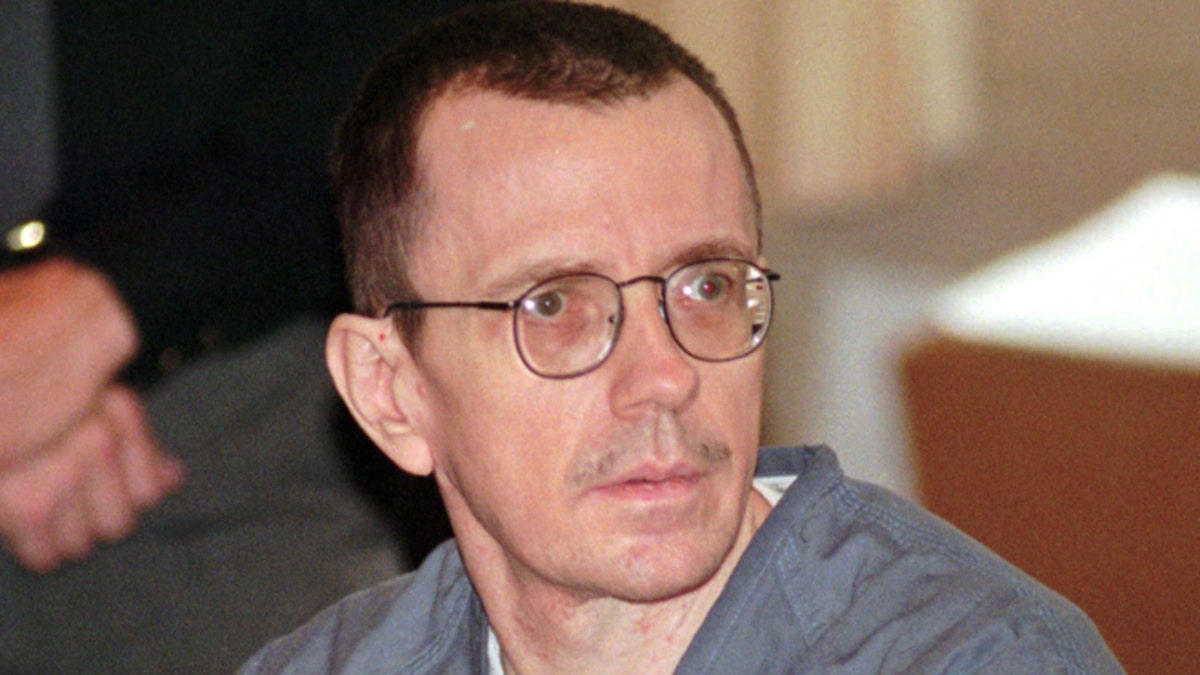
Oct. 19, 1998: In this file photo, Joseph Paul Franklin sits in Hamilton County Common Pleas Court where jury selection was set to begin in his murder trial in Cincinnati.
White supremacist serial killer Joseph Paul Franklin was put to death Wednesday following a federal appeals court ruling that overturned two stays granted Tuesday evening by district court judges in Missouri.
Franklin, 63, was executed at the state prison in Bonne Terre for killing Gerald Gordon in a sniper shooting at a suburban St. Louis synagogue in 1977. Franklin was convicted of seven other murders across the country and claimed responsibility for up to 20 overall, but the Missouri case was the only one that brought a death sentence.
Mike O'Connell, of the Missouri Department of Corrections, said Franklin was pronounced dead at 6:17 a.m.
The execution was the first in Missouri using a single drug, pentobarbital.
The 8th U.S. Circuit Court of Appeals ruled early Wednesday that Missouri could proceed with Franklin's execution, just hours after a lower court blocked the execution and claimed Missouri's disputed lethal injection protocol must be resolved before it could go forward.
The appeals court's ruling overturned a ruling by U.S. District Court Judge Nanette Laughrey, who held that the Missouri Department of Corrections "has not provided any information about the certification, inspection history, infraction history, or other aspects of the compounding pharmacy or of the person compounding the drug." She noted that the execution protocol, which has changed repeatedly, "has been a frustratingly moving target."
The St. Louis Post-Dispatch reported that U.S. District Judge Carol E. Jackson in St. Louis had granted a second stay late Tuesday, based on a separate defense appeal claiming Franklin is mentally incompetent to be executed.
The state appealed both rulings to the 8th U.S. Circuit Court of Appeals in St. Louis on Tuesday night, the newspaper reported.
Like other states, Missouri long had used a three-drug execution method. Drugmakers stopped selling those drugs to prisons and corrections departments, so in April 2012 Missouri announced a new one-drug execution protocol using propofol. The state planned to use propofol for an execution last month.
But Gov. Jay Nixon ordered the Missouri Department of Corrections to come up with a new drug after an outcry from the medical profession over planned use of the popular anesthetic in an execution. Most propofol is made in Europe, and the European Union had threatened to limit exports of it.
The corrections department turned to pentobarbital made through a compounding pharmacy. Few details have been made public about the compounding pharmacy, because state law provides privacy for parties associated with executions.
"Throughout this litigation, the details of the execution protocol have been illusive at best," Laughrey wrote. "It is clear from the procedural history of this case that through no fault of his own, Franklin could not resolve his claims without a stay of his scheduled execution date."
She added: "Franklin has been afforded no time to research the risk of pain associated with the Department's new protocol, the quality of the pentobarbital provided, and the record of the source of the pentobarbital."
Missouri Attorney General Chris Koster’s office argued in a motion to vacate Laughrey’s ruling that “the use of sufficiently potent pentobarbital, in the dose planned, will lead to a rapid and painless death, ” and that the Supreme Court has said some risk of pain is inherent in any method of execution, the St. Louis Post-Dispatch reported.
Franklin, a paranoid schizophrenic who grew up in Mobile, Ala., was in his mid-20s in 1977 when he began drifting across America, robbing up to 16 banks to fund his travels.
He also admitted to shooting and wounding civil rights leader Vernon Jordan and Hustler magazine publisher Larry Flynt, who has been paralyzed from the waist down since the attack in 1978.
He bombed a synagogue in Chattanooga, Tenn., in July that year. No one was hurt, but the killings began soon after that, many of them sniper shootings.
Franklin had a particular dislike for interracial couples -- several of his victims were black men and the white women with them.
He bombed a synagogue in Chattanooga, Tenn., in July that year. No one was hurt, but the killings began soon after that, many of them sniper shootings.
Franklin had a particular dislike for interracial couples -- several of his victims were black men and the white women with them.
He arrived in suburban St. Louis and picked out Brith Sholom Kneseth Israel synagogue from the Yellow Pages. On Oct. 8, 1977, a bar mitzvah ended and guests were in the parking lot when Franklin opened fire from a grassy area nearby, killing Gordon, 42.
The killings continued for three more years. Franklin was finally caught after killing two young black men who were about to go jogging with two teenage white girls in Salt Lake City in August 1980.
Years later, in federal prison, he admitted to the St. Louis County killing. He was sentenced to death in 1997.
In an interview with the St. Louis Post-Dispatch on Monday, Franklin insisted he no longer hates blacks or Jews. While he was held at St. Louis County Jail, he said he interacted with blacks at the jail, "and I saw they were people just like us."
The Associated Press contributed to this report.








































